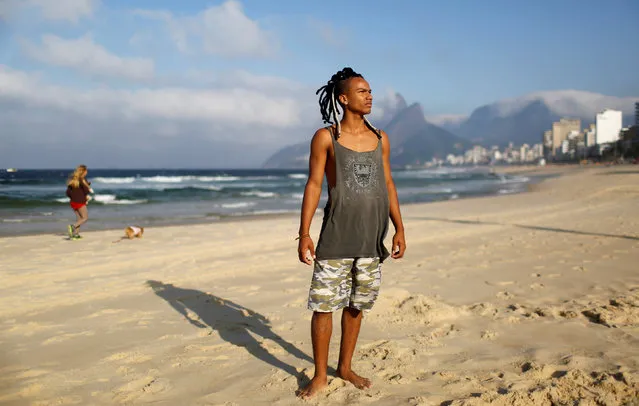
Just a week before Rio de Janeiro hosts South America's first Olympics, city residents expressed mixed feelings about the cost and security of the Games, while holding out hope they will bring joy to a nation facing economic and political crises. The conflicted thoughts mirror a recent survey by the Datafolha polling group showing that half of Brazilians were opposed to holding the Games, while 63 percent think the costs of hosting the event will outweigh benefits. Here: Student and acrobat Guilherme Barbosa, poses for a portrait at Ipanema beach in Rio de Janeiro, Brazil, June 18, 2016. When asked if Cariocas (locals) will benefit from the Olympics, he said, “Those in a position to rent out rooms in their houses can earn extra income, as well as those who work in the tourism industry. But most people are abandoned in precarious health and education services”. If there was a vote, he would cast against the Olympics. (Photo by Pilar Olivares/Reuters)
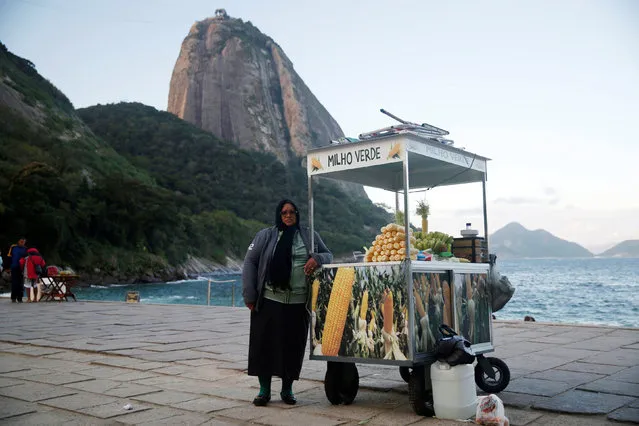
Ducinea Rancheiro, a 48-year-old street vendor, poses for a portrait at the Praia Vermelha (Red Beach) in Rio de Janeiro, Brazil, June 25, 2016. When asked what she thought about Rio de Janeiro hosting the Olympics, Ducinea said, “I am not a person who identifies with sports, but it will be good because it has given people work by generating jobs mostly in the tourism sector”. (Photo by Pilar Olivares/Reuters)
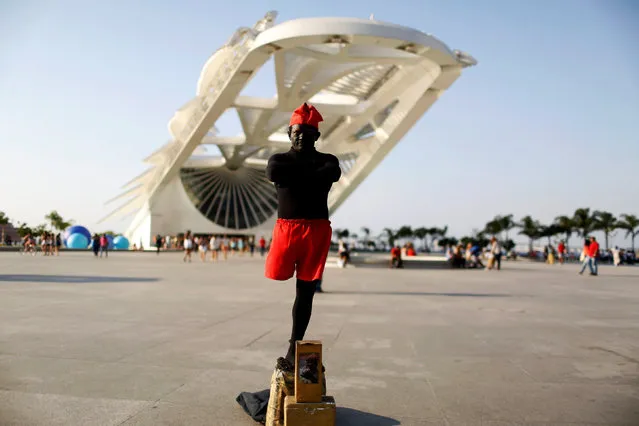
Erinaldo Cardoso, a 43-year-old street performer, poses for a portrait in front of the Museu do Amanha (Museum of Tomorrow) in Rio de Janeiro, Brazil, July 13, 2016. When asked what he felt about Rio de Janeiro hosting the Olympics, Erinaldo said, “Nothing will change after the Olympics. Everyone who knows the reality of Rio de Janeiro knows that it is not all happiness”. He also is concerned that the jobs that have been generated will be lost after the games. (Photo by Pilar Olivares/Reuters)
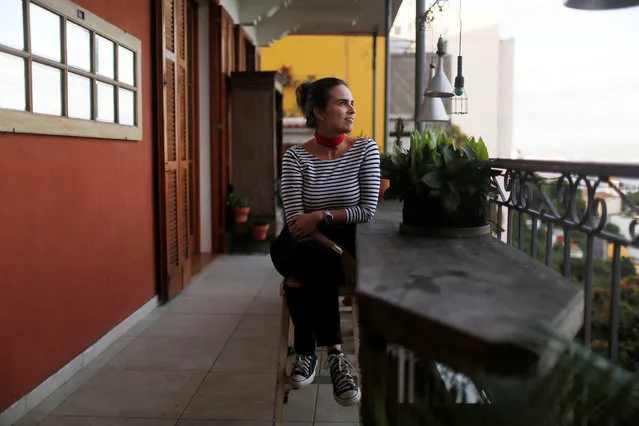
Gabriela Galvao, a 40-year-old businesswoman, poses for a portrait at her home in Rio de Janeiro, Brazil, June 27, 2016. When asked what she thought about Rio de Janeiro hosting the Olympics, Gabriela said, “The city of Rio de Janeiro always had bad services and the image of a disordered and violent city, but during the Olympics tourists will get the best impression because they come looking for fun”. (Photo by Pilar Olivares/Reuters)
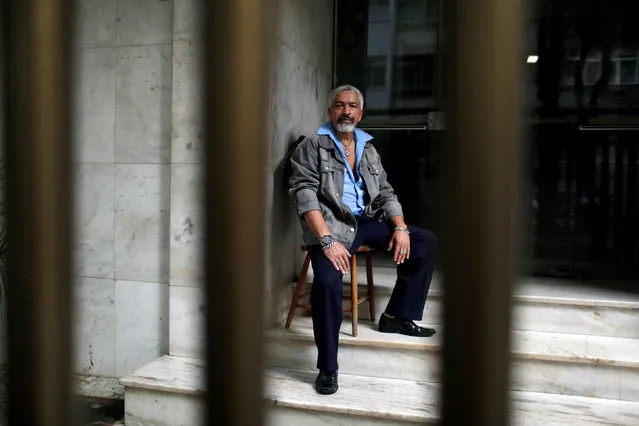
Israel Mario da Silva, a 59-year-old watchman poses for a portrait at his place of work in Rio de Janeiro, Brazil, June 30, 2016. Israel says, “I can't buy any tickets for the Olympics because they are too expensive for me”, he also hopes the impact of the Olympics will be positive because Rio de Janeiro is now a better city with improved public transport services and the Olympic Park. (Photo by Pilar Olivares/Reuters)
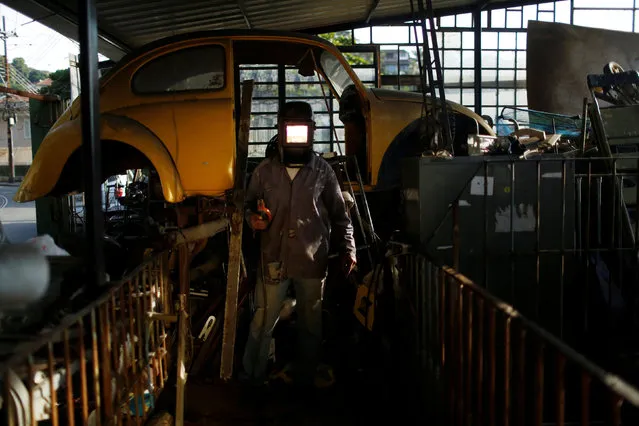
Pedro Grapiuna, a metalwork sculptor, poses for a portrait at his workshop in Rio de Janeiro, Brazil, June 29, 2016. When asked what he felt about Rio de Janeiro hosting the Olympics, Pedro said, “It is a good thing that lot of people will come from abroad to experience the good side of the city”. He is also concerned about violence and poor infrastructure. (Photo by Pilar Olivares/Reuters)
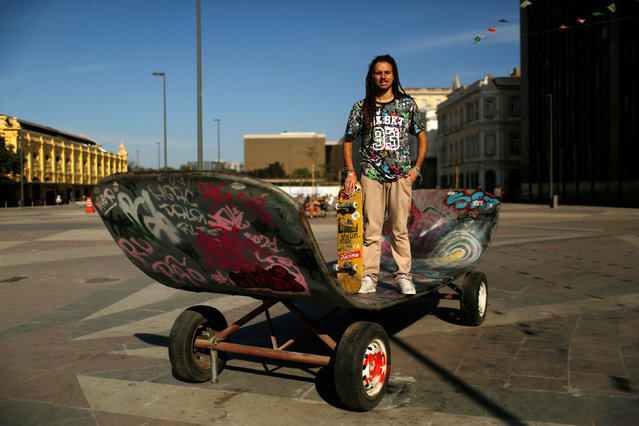
Mauricio Nava, a 29-year-old skater, poses for a portrait in Rio de Janeiro, Brazil, July 9, 2016. Mauricio says, “There are visible improvements in the city such as to public transport and recreational spaces, if it wasn't for the Olympics, Cariocas (locals) would not have benefited”. (Photo by Pilar Olivares/Reuters)
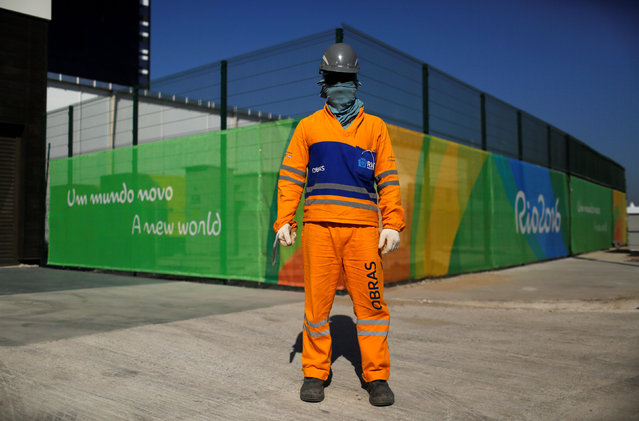
Dennis Claudinho, a 27-year-old construction worker, poses for a portrait in Rio de Janeiro, Brazil, July 11, 2016. Dennis says, “I can't afford tickets to the Olympics because they are too expensive”. He is very optimistic about the improvements in the transport service, and he thinks Cariocas (locals) will benefit. (Photo by Pilar Olivares/Reuters)
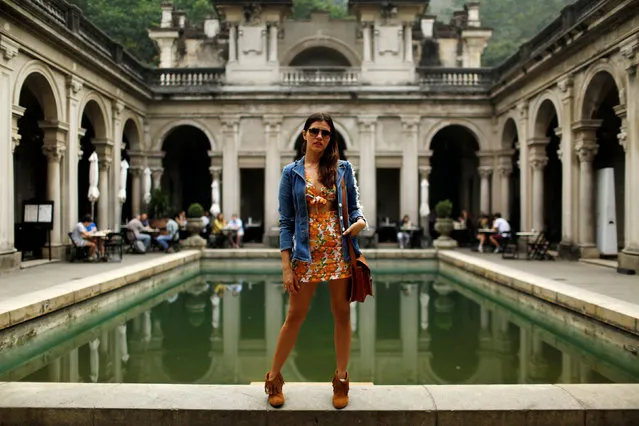
Maria Callou, a 35-year-old fashion designer, poses for a portrait in Rio de Janeiro, Brazil, June 30, 2016. When asked what she felt about Rio de Janeiro hosting the Olympics, Maria said, “I am glad about the Olympics and I think the problems of the country, such as corruption and violence, will go unnoticed during the event. We are hospitable people and we know how to bring joy and happiness to tourists”. (Photo by Pilar Olivares/Reuters)
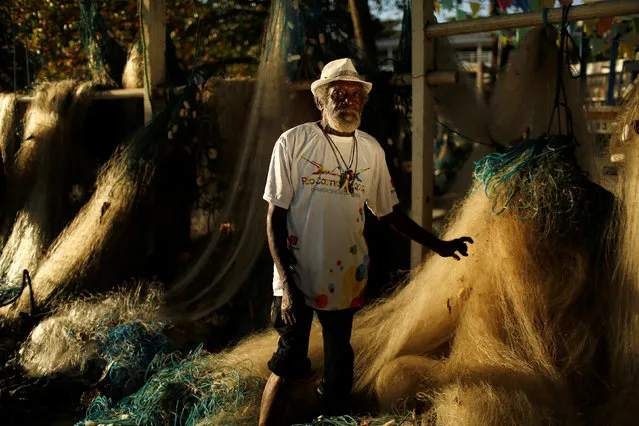
Jose de Jesus Damaceno, a 75-year-old fisherman, poses for a portrait in Rio de Janeiro, Brazil, July 13, 2016. When asked what he felt about Rio de Janeiro hosting the Olympics, Jose de Jesus said, “The city is in crisis and there is no opportunity for anyone, the government should take more care of the population before spending money on an event like this”. (Photo by Pilar Olivares/Reuters)
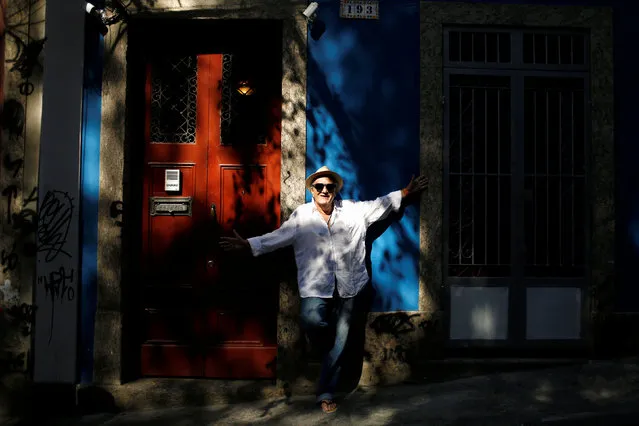
Jorge Salomao, a 70-year-old poet, poses for a portrait outside a bar in Rio de Janeiro, Brazil, July 15, 2016. When asked what he felt about Rio de Janeiro hosting the Olympics, Jorge said, “We are going through so many difficult times that the Olympics will bring a moment of joy and fraternization in this city that is the most beautiful in the world”. (Photo by Pilar Olivares/Reuters)
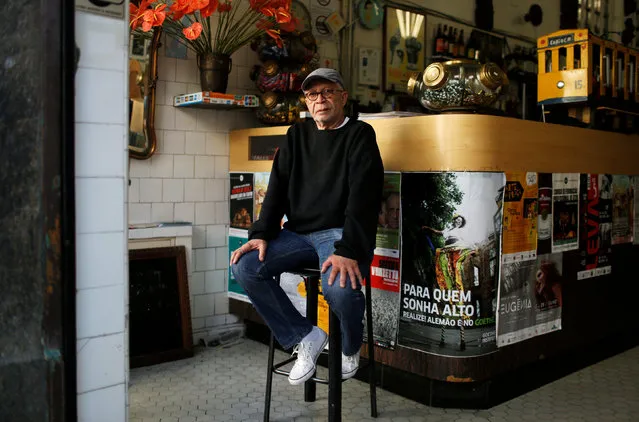
Diogenes Paixao, a bar owner, poses for a portrait in Rio de Janeiro, Brazil, July 15, 2016. When asked what he felt about Rio de Janeiro hosting the Olympics, Diogenes said, “The Olympics will bring many tourists looking for fun and entertainment, I am only concerned about security on the streets”. (Photo by Pilar Olivares/Reuters)
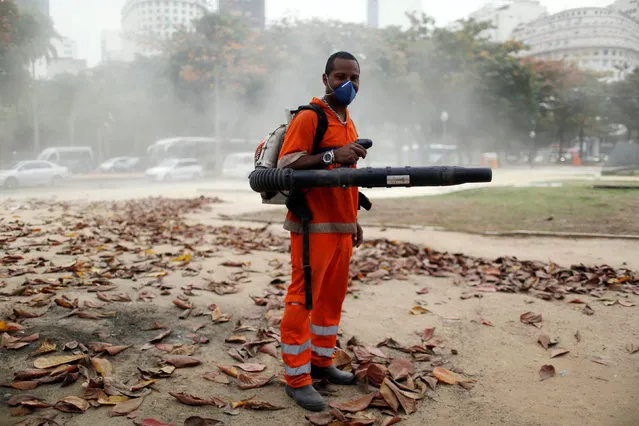
Andre Barros, a 44-year-old street cleaner, poses for a portrait in Rio de Janeiro, Brazil, July 20, 2016. When asked what he felt about Rio de Janeiro hosting the Olympics, Andre said, “I can't afford tickets to the Olympics. I need to work”. He also said, “People will benefit from the improvement of public transport”. (Photo by Pilar Olivares/Reuters)
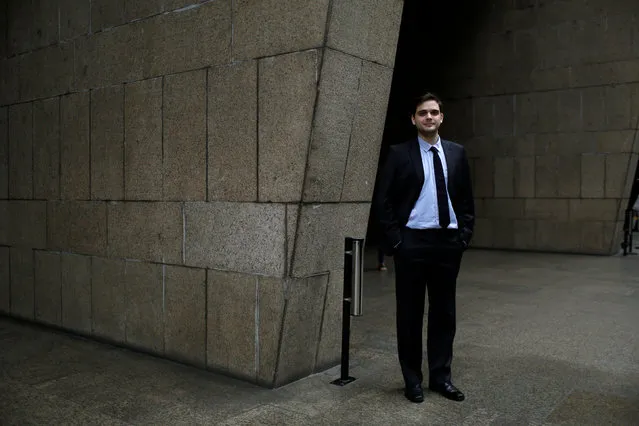
Antonio Mariano de Azevedo, a 25-year-old political advisor, poses for a portrait in Rio de Janeiro, Brazil, July 21, 2016. When asked what he felt about Rio de Janeiro hosting the Olympics, Antonio said, “Rio de Janeiro will not change after this event. For the government the Olympic infrastructure has been more important than investing in improved services for the population”. He also said, “I am against the Olympics, the city is in crisis”. (Photo by Pilar Olivares/Reuters)

Jeymerson Pereira, a 25-year-old butcher, poses for a portrait in Rio de Janeiro, Brazil, July 19, 2016. When asked what he felt about Rio de Janeiro hosting the Olympics, Jeymerson said, “We don't need the Olympics, we need more schools and hospitals." He is also concerned that nothing will change for the poor in Rio de Janeiro, “We would need to change the government and start afresh”. (Photo by Pilar Olivares/Reuters)
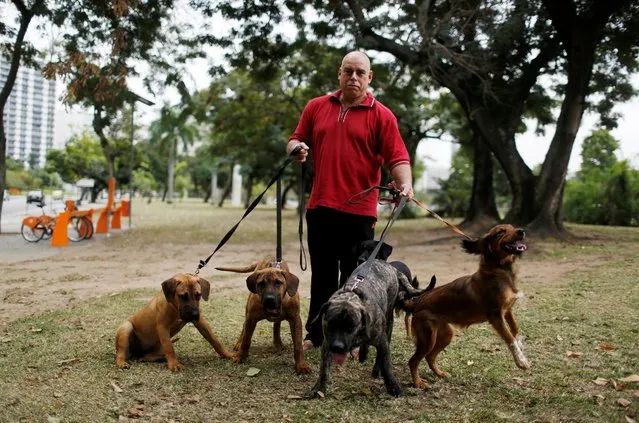
Manfred Kulitc, a 49-year-old mathematician, poses with his dogs for a portrait in Rio de Janeiro, Brazil, July 20, 2016. When asked what he felt about Rio de Janeiro hosting the Olympics, Manfred said, “I don't care too much about the Olympics, this country has no infrastructure for an event like this. The real problems of the population have not been resolved”. He is also concerned for the safety of tourists. (Photo by Pilar Olivares/Reuters)
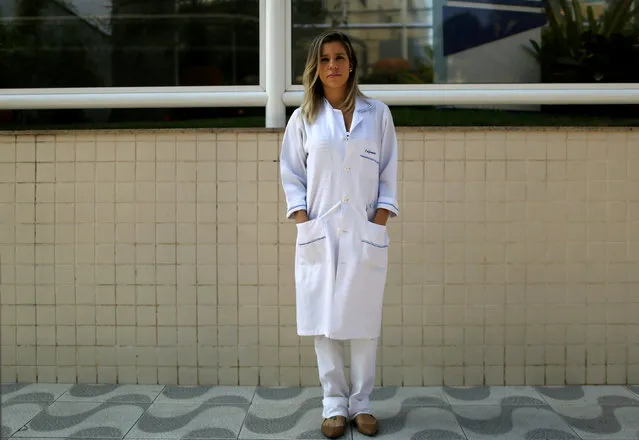
Danielle Bhering, a 32-year-old nurse, poses for a portrait in Rio de Janeiro, Brazil, July 23, 2016. When asked what she felt about Rio de Janeiro hosting the Olympics, Danielle said, “I'm unhappy with the Olympics at a time when the country is living with violence, I don't want to leave my home during the games”. She also said, “It is difficult to accept this huge event with our polluted Guanabara Bay and the violence in the city”. (Photo by Pilar Olivares/Reuters)
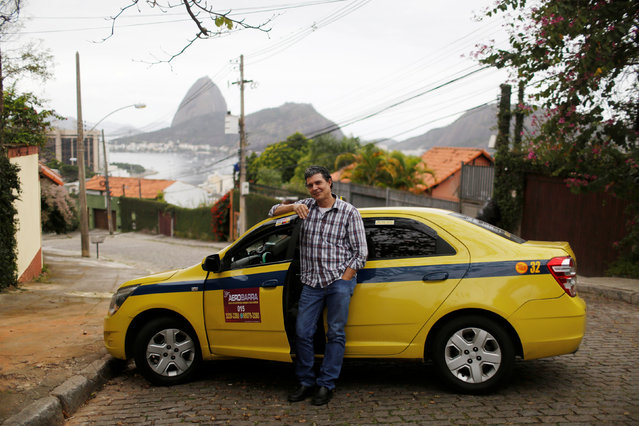
Abner Lelis, a 54-year-old taxi-driver, poses for a portrait in Rio de Janeiro, Brazil, July 28, 2016. When asked what he felt about Rio de Janeiro hosting the Olympics, Abner said, “I'm glad that the government has invested in improving transport and infrastructure, I spend almost the whole day driving and it's evident that traffic has improved”. He is concerned that, “Sometimes my colleagues, the taxi-drivers, take advantage of tourists, taking long ways to charge more in the taximeter”. (Photo by Pilar Olivares/Reuters)
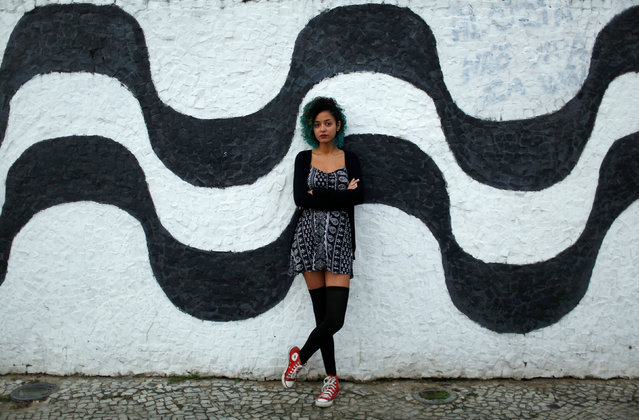
Aline Santos, a 23-year-old student, poses for a portrait in Rio de Janeiro, Brazil, July 23, 2016. When asked what she felt about Rio de Janeiro hosting the Olympics, Aline said, “For me the Olympics are synonymous with arbitrary because many people have been evicted from their houses for the construction of the Olympic Parks. I am totally against the Olympics”. (Photo by Pilar Olivares/Reuters)
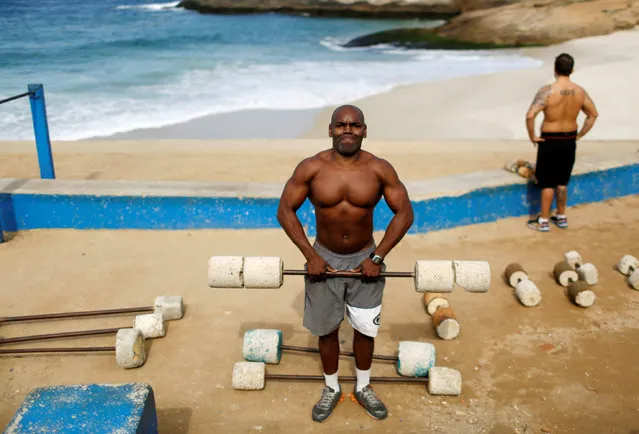
Marcos Da Costa, 46-year-old, poses as he works out at the Arpoador beach in Rio de Janeiro, Brazil, June 24, 2016. When he asked if he had bought tickets for the Olympics he said, “I don't agree with the Olympics while people in Rio suffer violence, bad health services, insecurity and construction works like the poorly-designed cycle path”. (Photo by Pilar Olivares/Reuters)

Dayvison Nascimento, a 25-years-old bartender, poses for a portrait at the Ipanema beach in Rio de Janeiro, Brazil, June 24, 2016. Dayvison says, “I expect many tourists will come here and enjoy the energy of the city and the event”, but he is concerned that police could not control effectively the violence in the city. He hopes the impact of the Olympics will be positive and Rio de Janeiro will improve its international image. (Photo by Pilar Olivares/Reuters)
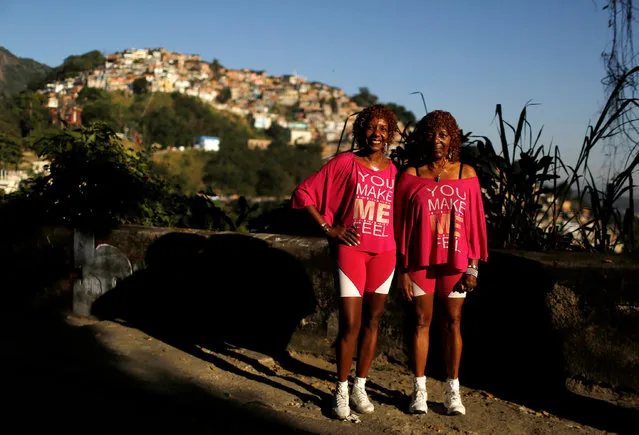
Silvana Batista (L), a 49-year-old retired nurse, poses with her mother, Helena Batista, in Rio de Janeiro, Brazil, July 12, 2016. Silvana and Helena are fearful and live in a slum that is in a constant battle between gangs. When they were asked about the Olympics in Rio de Janeiro, they said, “We are living in hard and violent times in the city, we are concerned that all the security on the streets could not be enough”. They also hope the event will be a success and people who come to the city will have the best experience. (Photo by Pilar Olivares/Reuters)
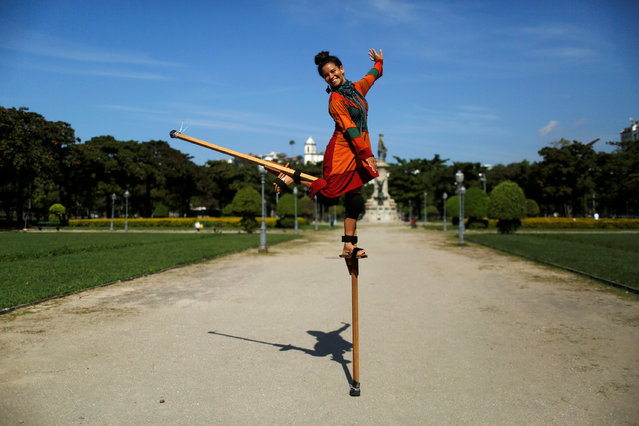
Raquel Poti, a 32-year-old street artist, poses at a park in Rio de Janeiro, Brazil, June 25, 2016. Raquel thinks the Olympics promotes a lifestyle that combines sports, culture and education. She is concerned about the large investment for the event while the population needs improvements in basic services. (Photo by Pilar Olivares/Reuters)
03 Aug 2016 11:51:00,
post received
0 comments
